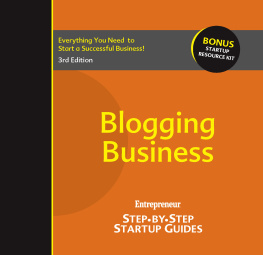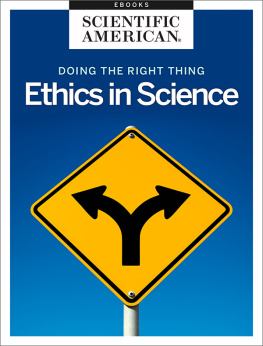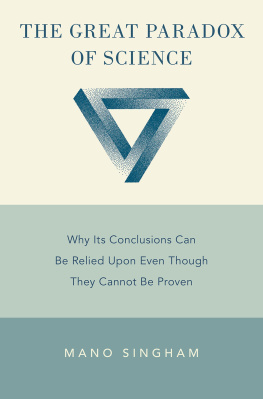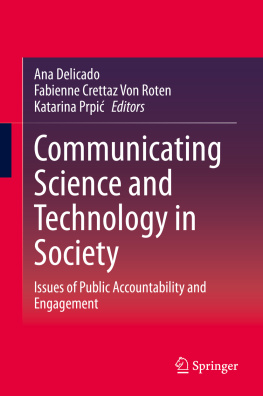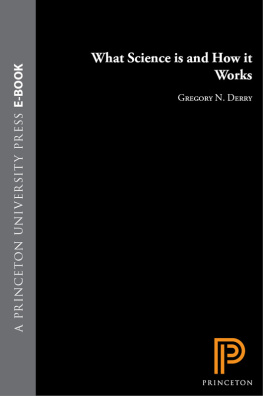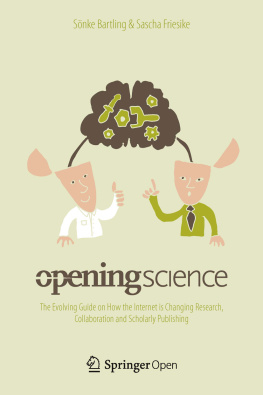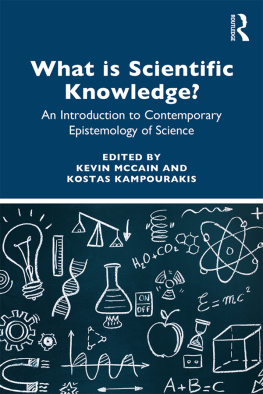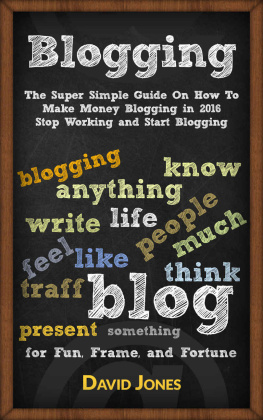Science Blogging
Science Blogging: The Essential Guide
Edited by
CHRISTIE WILCOX
BETHANY BROOKSHIRE
JASON G. GOLDMAN

Published with assistance from the foundation established in memory of William McKean Brown.
The authors gratefully acknowledge the assistance of the Alfred P. Sloan Foundation and the National Association of Science Writers. This project was funded in part by a grant from the National Association of Science Writers. Reference to any specific commercial product, process, or service does not necessarily constitute or imply its endorsement of or recommendation by the National Association of Science Writers, and any views and opinions expressed herein do not necessarily reflect those of the National Association of Science Writers.
Copyright 2016 by Christie Wilcox, Bethany Brookshire, and Jason G. Goldman.
All rights reserved.
This book may not be reproduced, in whole or in part, including illustrations, in any form (beyond that copying permitted by Sections 107 and 108 of the U.S. Copyright Law and except by reviewers for the public press), without written permission from the publishers.
Yale University Press books may be purchased in quantity for educational, business, or promotional use. For information, please e-mail (U.K. office).
Designed by Sonia L. Shannon
Set in Scala type by Integrated Publishing Solutions
Printed in the United States of America.
Library of Congress Control Number: 2015946024
ISBN 978-0-300-19755-6 (paperback)
A catalogue record for this book is available from the British Library.
This paper meets the requirements of ANSI/NISO Z39.48-1992 (Permanence of Paper).
10 9 8 7 6 5 4 3 2 1
Contents
Christie Wilcox, Science Sushi, Discover Magazine
Carl Zimmer, The Loom, National Geographic
Khalil A. Cassimally, The Conversation
Glendon Mellow, Symbiartic, Scientific American
Ed Yong, Not Exactly Rocket Science, National Geographic
Janet D. Stemwedel, Adventures in Ethics and Science
Danielle N. Lee, The Urban Scientist, Scientific American
Zen Faulkes, University of Texas-Pan American
Rose Eveleth, Science Studio
Joe Hanson, Its Okay to Be Smart, PBS Digital Studios
Ben Lillie, The Story Collider
Alberto I. Roca, Minority Postdoc.org
Kate Clancy, Context and Variation
Colin Schultz, Hakai Magazine
Karl Bates, Duke University
Marie-Claire Shanahan, Science for the People
Jason G. Goldman, Freelance Science Writer
Greg Gbur, Skulls in the Stars
Matt Shipman, Communication Breakdown, SciLogs
Liz Neeley, The Story Collider
Travis Saunders and Peter Janiszewski, Obesity Panacea, PLOS Blogs
Rhett Allain, Dot Physics, Wired
Emily Willingham, The Evidence-Based Parent
Melanie Tannenbaum, PsySociety, Scientific American
Bethany Brookshire, Scicurious, Science News
Brian Switek, Laelaps, National Geographic
Paige Jarreau, From the Lab Bench, SciLogs
Preface
Why are you here?
We dont mean that in the existential sense. But what are you doing, right now, with this book in your hands? (Or more likely with this book displayed on some electronic device?) What is it that you want to know about science blogging?
Online science communication has come a long way from the early days of LiveJournal and Usenet. Bloggers are no longer sending messages in bottles with only blogrolls and hyperlinks to keep us connected, each of us in our own little far-flung corner of the Internet. Platforms such as Twitter and Facebook may not feel all that new, but theyre revolutionary tools that have allowed us not just to interact with each other but also to reach wider and more diverse audiences. Many of us are now clustered together in official networks, under the umbrella of large, mainstream magazines or newspapers. Some independent blogs have grown into high-traffic sites, destinations unto themselves. Science bloggers are no longer limited to blog posts but are also writing books, recording podcasts, and uploading videos to YouTube. For many, science communication is a viable career.
When the three of us started blogging, the crowd was smaller. There were fewer science blogs, which meant it was easier to distinguish ourselves from other bloggers. It was easy to find our voices and to make ourselves heard. It was a time when someone sufficiently motivated could read just about every new blog post written about science each day.
That is no longer the reality. Today breaking in to online science communication can seem almost impossible. It can seem like there are dozens of new science blogsnot to mention YouTube channels and podcastspopping up each day. But the Internet is still very much a frontier for science communicators. Its the Wild West. Each time the scene threatens to become too settled, someone or something new arrives, keeping us all on our toes. The struggle was once to become heard at all; now the struggle is to remain relevant.
Maybe youre reading this book because you wish to be that someone new. To disrupt the status quo. Or perhaps youre here to get new ideas. Maybe youre here to get your blog to the next level, to transition from blogging as a hobby to blogging as a career. Or maybe youre here to figure out just where your voice fits in the online world.
No matter your goals, this book is here to help. Weve brought twenty-seven of the most successful, insightful online science communicators together to share with you what their years of experience have taught them. All of their expertise is as current as we could make it; as of this writing all of the online references youll see are up-to-date and available.
But you dont need to read this book cover to cover to learn what you need to know. Depending on your goals, there are different chapters, different paths through this book that will help you on your way. Here are just a few ideas.
Science Blogging 101
Maybe you are getting started as a blogger and need ideas about how to proceed. In that case, you might start with by Danielle N. Lee and Zen Faulkes. They present two different views on science blogging, one from within an official blog network, and one at a personal, independent site.
As you get in gear, check out .
Once you have your blog up and running, its time to think about how you might best communicate your science to the wider world. It doesnt all have to be long essays. Joe Hanson discusses how to be effective by being brief, in , Rhett Allain covers some of the specific challenges that might arise when tackling the hard sciences.
Telling Your Own Story
No one starting as a science communicator wants to get lost in the crowd. We all have different stories to tell, different angles we can use to communicate. But sometimes it can be difficult to find your own unique voice.
Your approach to science blogging might be influenced by your life experiences. In .
Many people come to science blogging through their careers..
While many fine blogs exist to explain concepts and cover research papers, not all of them need to conform to this standard. Scientist Travis Saunders and science writer Peter Janiszewski describe how they use their blog to cover scientific conferences in .
Next page

